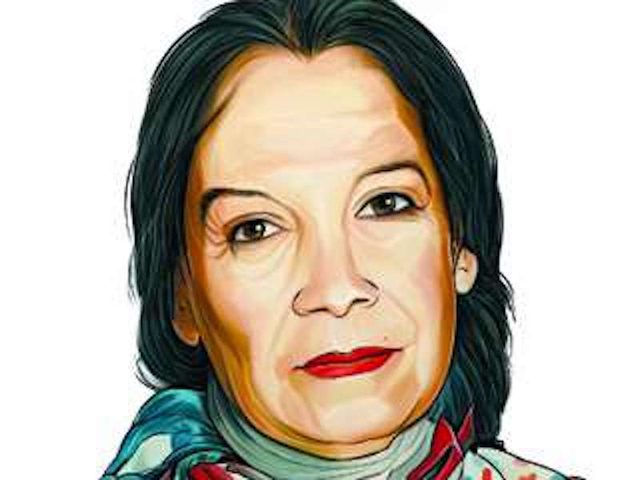The Palestinian poet Fadwa Tuqan represented the Palestinian woman in her suffering and her ability to triumph and rebel against reality, expressing the concerns of the people and the Palestinian cause with feminine touches.
Tuqan, who was born in 1917, was famous for her revolutionary poems that dealt with the Nakba and the struggle, in addition to the Palestinian identity until 2003, and in which she was distinguished by courage and creativity, which aroused the admiration of the Palestinians and the Arab world throughout the ages, which is why many of her poems were taught in the Palestinian curricula.
Tuqan was influenced by her brother, the Palestinian poet Ibrahim Tuqan, who is considered her godfather in her culture and the development of her talent.
“Small events sometimes leave a big impact on an individual’s life.” A phrase made famous by Tuqan, who lived a bitter childhood, as she was deprived of studying after the fifth grade of primary school because of her family, which was characterized by extremism at the time of her childhood.
The Palestinian writer and critic Adel Al-Osta believes that Ibrahim Tuqan had a great influence on teaching his sister Fadwa, through mail correspondence from Beirut, and she used to write poetry for him and he encouraged her to publish it, which made her publish many of her poems under pseudonyms such as (Dinanir) and (Umm Tammam).
Toukan published her first collection of poetry, entitled “My Brother Ibrahim,” in 1956, in honor of the memory of her brother, who died in 1941.
“Her autobiography is a difficult journey, a mountainous journey, which is the first autobiography by a Palestinian woman,” Al-Osta describes.
Toukan resided in London for two years, and during her stay there she wrote her autobiography entitled “My Days in London Are Unforgettable.” The Palestinian Nakba and the defeat of the Six-Day War in 1967 had a profound impact on her way of thinking and writing.
Tuqan chose from writing about herself to writing nationally in light of the suffering suffered by the Palestinian people during the years of the Israeli occupation of the Palestinian territories, and her meetings with Palestinian poets Mahmoud Darwish, Samih Al-Qasim, and Tawfiq Ziad had an impact in dealing with poetic topics.
Tuqan was known as one of the poets of the “Palestinian resistance.”
Tuqan’s famous poetry collections “Alone with the Days” (1952), “Give Us Love” (1960), “In Front of the Closed Door” (1967), and “Martyrs of the Intifada” (1988) trace the development of Palestinian political consciousness: from shock and despair and the victim, to steadfastness, resistance and renewed pride.
In portraying Tuqan herself as a link in the chain of history, she said, “It is enough for me to die on its land... and be buried in it... and under its soil I melt and perish... and I will spread grass on its land... and I will send a flower... which will be destroyed by the palm of a child that my country has grown... it is enough for me to remain in the bosom of my country... “Dust, grass, and flower.”
While she published her last collection in 2000, entitled “The Last Tune,” in which she returned to writing about herself and a new love experience when she was in her seventies, saying, “Every person is capable of love at any age.”
Toukan has won poetry prizes from Italy, Greece, and Jordan. She received the Jerusalem Prize for Palestinian Culture and Arts in 1990; She served on the Board of Trustees of An-Najah University in Nablus.
The Palestinian novelist Al-Mutawakkil Taha considered the strength of Tuqan’s poetry, which he describes as his spiritual mother, and whose biography he studied during his academic studies, as that she was breaking taboos and calling for freedom, resistance, steadfastness, and the preservation of identity.
“Repression leads to one of two results: either it eliminates the oppressed or it sends resistance factors into it,” Al-Mutawakkil Taha said.
Toukan’s experience of marginalization, oppression, and isolation from her family since her childhood inspired her, with the help of her brother, to produce her most beautiful poetry, according to what Taha said.
He pointed out that her acquaintance with British literature and her friendship with Iris Murdock, the British novelist, increased her knowledge and the depth of her experiences.
Taha said, "She gave me 17 poems in her handwriting and asked not to open them until God dies."
Regarding its impact on the Palestinian cultural scene, Al-Mutawakkil Taha confirmed that
"Fadwa's impact was great on women and society, as she opened the door and opened a new style that enabled her to engage with major Palestinian poets, politicians, and writers. She constituted a pioneering feminist case that influenced the feminist cultural movement in particular."
Fadwa writes affectionately about the “Old City,” London, where anyone can become anonymous – at least for a moment. Fadwa has traveled widely in Europe and the Middle East, where she borrowed ideas from her life in exile and mixed them with bold expressions of her feminine desires.
Tuqan’s poems have been translated into English, French, Spanish, Italian, and German.
“It is women who make a nation, not men.” “Freedom is life, and life is freedom.” “Hope is the light that illuminates our lives in the darkest circumstances.” It was one of the most beautiful things Tuqan said in her writings and interviews, in expressions that expressed her personality in support of women and Palestine.






